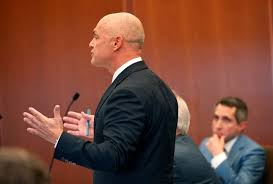In September 2025, the legal landscape around Karen Read has further evolved with new filings, court motions, and emerging civil claims connected to the wrongful death lawsuit filed by the family of John O’Keefe, a Boston Police officer. Read, who was acquitted of the major charges in the criminal trials, is now facing additional civil proceedings and legal maneuvers that could have significant future implications.
To fully understand recent events, it helps to recall the background: the death of John O’Keefe occurred on January 29, 2022, outside the home of fellow officer Brian Albert, after which Read was indicted on charges including second-degree murder, leaving scene of a collision, and manslaughter. (Wikipedia)
Recent Court Actions in September 2025
Motion to Dismiss Emotional Distress Claims
On September 22, 2025, Read’s attorneys asked a Plymouth County Superior Court judge, Daniel O’Shea, to dismiss certain emotional distress claims made by O’Keefe’s parents, brother, and niece. The defense argument is that these family members lack standing because they did not witness John O’Keefe’s death, nor did they see his body until after he was declared dead at the hospital. (AP News)
Read’s Plan to Add Defendants & Pursue Civil Rights Claims
At the same hearing, Read announced intent to bring additional civil claims against multiple individuals and entities. Her defense team, led by attorney Damon Seligson, revealed plans to sue:
- Civilian witnesses from the night of O’Keefe’s death, including members of the Albert and McCabe families and Brian Higgins.
- Investigators from the Massachusetts State Police: Detective Lt. Brian Tully, Sgt. Yuriy Bukhenik, and ex-Trooper Michael Proctor.
- The State Police itself, some deputies, and possibly even the town of Canton and its police department for alleged negligent supervision or failure to preserve evidence.
The new claims include civil rights violations, conspiracy, and negligent training or retention of personnel. (Boston.com)
Timeline & Delays: Next Steps
Due to the proposed expansion of the list of defendants, the trial is expected to be further delayed. Judge O’Shea has indicated that the inclusion of additional parties will slow the process, likely postponing any full civil trial until at least Spring 2027. (Court TV)
Key Legal Status & Past Milestones
To place these September 2025 developments in context:
- The first trial in 2024 ended in a mistrial due to a hung jury. (CBS News)
- The second trial began in April 2025. On June 18, 2025, Read was found not guilty of the most serious charges (second-degree murder, manslaughter, etc.), but did face a conviction for operating a vehicle under the influence (OUI), resulting in one year probation. (Wikipedia)
These outcomes set the stage for the wrongful death civil lawsuit, which was filed by O’Keefe’s family in August 2024, including the bars where Read and O’Keefe had been drinking that evening. (Wikipedia)
What’s New in September — Implications
The updates in September 2025 show a strategic shift by Read’s defense and her legal team:
- The motion to dismiss emotional distress claims could narrow the scope of the lawsuit, reducing potential liability or damages if the court agrees that some plaintiffs lack standing.
- By adding more defendants — both civilian witnesses and law enforcement figures — Read is pushing back against allegations, attempting to spread blame or implicate others in the legal narrative.
- Read’s civil rights and conspiracy claims suggest that the defense is positioning not just to defend against claims, but to switch to an offensive posture, alleging wrongdoing by investigators and prosecutors.
- The expected delay until Spring 2027 means this civil case will remain in the spotlight, giving both sides much longer to gather evidence, conduct discovery, and build public narratives.
Related Background from Wikipedia
For readers wanting to dive deeper into the foundational facts of this case, two relevant Wikipedia articles provide helpful context:
- Death of John O’Keefe — this page gives a detailed timeline of O’Keefe’s death, Read’s criminal charges, trials, and major verdicts.
- Michael W. Morrissey — while not the central figure in every recent development, the District Attorney’s office under Morrissey had been involved in charging and prosecuting Read. This helps understand prosecutorial context.
Challenges & What to Watch
Here are key legal, strategic, and media-related issues to keep an eye on:
- Standing and Witness Credibility: Courts often dismiss part of claims if plaintiffs lack standing. The emotional distress claim dismissal motion is a test case for that.
- Evidence Disclosure & Discovery: With more parties added, gathering robust evidence—especially from law enforcement or civilian witnesses—could become complicated.
- Media & Public Perception: The defense’s claims of conspiracy and cover-ups could gain traction in public discourse, especially through news media or social platforms, which might influence reputational risk.
- Civil Jury vs Criminal Jury: The standards are different. While Read was acquitted in criminal court (where “beyond a reasonable doubt” applies), civil court claims work on “preponderance of evidence.” That lower threshold often makes civil outcomes more possible even after acquittal.
- Timeline & Legal Fees: Extended litigation means more legal costs, potentially for both sides. Read’s defense and the O’Keefe family will need to sustain funding, evidence collection, and legal strategy over a longer period.
What to Expect Next
Given the current pace and recent filings, here’s what might unfold in coming months:
- A ruling on the motion to dismiss emotional distress claims, which may remove some plaintiffs or reduce claims.
- Formal motions to add new defendants will be filed and challenged; some may be accepted, others rejected.
- Additional pretrial hearings for discovery, depositions, and perhaps even motions to consolidate related claims.
- Media coverage intensifying, especially around allegations of conspiracy, witness credibility, and law enforcement conduct.
- Possibly new evidence or documents (from State Police, civilians, or investigators) coming to light during discovery.
Conclusion
September 2025 has brought substantial developments in the Karen Read civil case. The defense has aggressively moved to reshape the lawsuit — dismissing some claims, adding others, and seeking to implicate a broader set of individuals. With the criminal trials concluded, the civil yacht is moving forward with high stakes. The outcomes of motions in the coming months will be important markers that could dictate how far and how fast the case proceeds.
FAQs
Q1: What was Karen Read convicted of in her criminal trial?
On June 18, 2025, she was acquitted of second-degree murder, manslaughter, and leaving the scene of a collision causing death; she was convicted only of operating a vehicle under the influence (OUI), which resulted in a one-year probation sentence. (Wikipedia)
Q2: What is the wrongful death lawsuit about?
The wrongful death lawsuit was filed by O’Keefe’s family in August 2024. It claims that Read caused John O’Keefe’s death and that bars where they had been drinking overserved her. The lawsuit also includes emotional distress claims from family members. (Wikipedia)
Q3: Why is Read’s defense seeking to add more defendants and witnesses?
Her defense alleges a conspiracy and cover-up involving both law enforcement and civilian witnesses. By adding these parties, Read hopes to shift part of the legal responsibility, introduce alternate narratives, and possibly dilute claims solely against her. (Boston.com)
Q4: What does “standing” mean in this context?
Standing refers to whether a plaintiff has a legal right to bring certain claims. Read’s counsel argues that some plaintiffs (e.g., O’Keefe’s family members) do not have standing to claim emotional distress because they did not witness the death or see his body before he was declared dead. (AP News)
Q5: When might the civil trial begin?
With additional defendants likely being added and the legal processes stretching out, current estimates point to a full civil trial not happening before Spring 2027. (Court TV)

